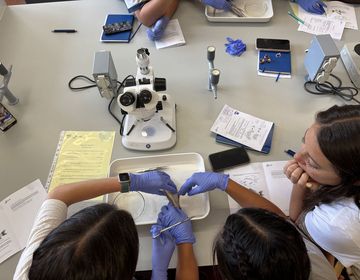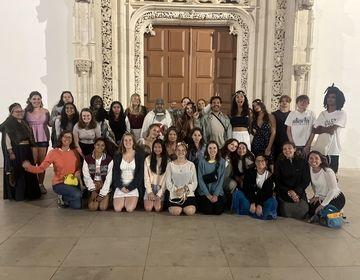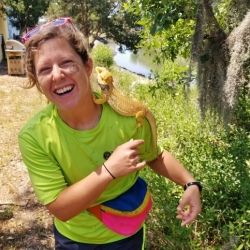Fighting the War on Plastic
Plastic Waste and it's Affects on The Environment
Did you know that 10 million tons of plastic are ending up in our ocean every year, as of 2017 (Throwdale, 2017)? Did you know that plastic is not biodegradable? Plastic only breaks down into smaller and smaller pieces until it is so tiny, it's microscopic. Well, if it is microscopic, how is it hurting our environment and wildlife? The pieces of plastic are so small that they are eaten by plankton (tiny organisms that are at the bottom of our food chain). Then the plankton are eaten by slightly larger fish, jellyfish, oysters, and so on, and those animals are eaten by bigger animals like tuna, sea turtles, sharks, and dolphins. This results in a huge buildup of plastics in the bodies of animals at the top of the food chain. This process is called bioaccumulation. And you know who eats many of the animals at the top of the food chain, HUMANS.
Not only is plastic found in the body of almost all marine animals, it also washes up on our beaches and turns pristine beaches in the middle of nowhere into a garbage dump. Marine and terrestrial animals get entangled in plastics and marine birds feed it to their young. Is this what we want? A world ruled by plastic?
All these questions play a huge role in conservation and have become a major concern to biologists and conservationists alike. Because of this, plastic pollution and sustainability is a huge part of our study abroad program here in Portugal.
What We've Done to Help Mitigate the Plastic Problem
We spent a whole day cleaning up beaches and learning about solutions to plastic pollution. We cleaned up trash on a stretch of beach about 200m long. The students were completely taken aback by the amount of trash we picked up in such a small section of beach. We were working with a marine biologist, Ana, who is a huge advocate for reducing our plastic consumption. She organizes beach clean ups and makes art out of the plastic pollution to help raise awareness. The majority of pollution we saw were balloons, styrofoam, lollipop sticks, q-tips, straws, and plastic bags. All these things are objects that we could easily eliminate from our lives without too much inconvenience, and save money while we're at it.
"It was so impactful digging up the huge piece of trash on the beach. It was really big and took so much effort to remove, so I felt accomplished when we finally removed it. The whole beach cleaning activity felt impactful." - Josie
"The most impactful thing I did on this trip is go to the beach and clean up garbage. Me, Josie, and Lollie dug out a huge tarp out of a rock and under the sand. I think this was very rewarding." -Raiya
"The most impactful thing I've done on this trip is when I dug up a gigantic sheet of plastic with Josie and Raiya. We worked tirelessly for an hour and were so happy when we got it out." - Xitlali
I think this activity was a huge eye opener to a lot of our students. Most people have no idea how deep plastic runs into all Earth's ecosystems. People use it, throw it away, and that's where their perception of the story ends. For example, most of us were confused about why there were so many q-tips on the beach. Then Ana told us that most people flush them down the toilet and once the sewage from the water treatment plant is treated, it goes into the ocean, and with it goes the q-tips. Gross, right? That also includes feminine products, so always think before you flush.
Once we finished cleaning up the beach, we were able to turn our finds into art of our own.
We also had a lot of beach goers come up and ask us questions about what we were doing. This was great because we raised awareness through our actions and hopefully inspired other people to think about their consumption and use of unsustainable products.
How Can You Help Fight the War on Plastic?
Now comes the question everyone asks: how can I make a difference? How can I reduce my plastic waste? I have a few easy steps that I use in my day to day life and steps the students have also been trying to use throughout our travels.
- Reduce
- Say no to plastic bags and buy and use a reusable one
- Choose to purchase things that can be used more than one time
- Don't use plastic straws or carry your own reusable one
- Carry your own coffee thermos and water bottle
- Reuse
- If you do get a plastic bag, reuse it
- Buy used clothes (one of my favorites, because it saves me money)
- Re-purpose things into art or whatever else your heart desires (be creative)
- Recycle
- Most places in the world recycle now, so do it!
- You can even get paid for recycling things like aluminum and steel
- Even things like plastic bags can be taken back to the grocery store and they'll re-purpose them
Quotes from our students about how impactful our day was!
“The most impactful activity we did, for me, was cleaning up the beach and learning about Ana's work. When we looked at what we collected you could actually see what we did and how it affects the environment. The fact that we made are just made it feel like we are bringing awareness to the topic.”
“The most impactful things we have done so far was picking up trash off the beach because we were making a huge difference and helping marine animals.”
“The most impactful things on this trip for me has been the day and lecture on plastics in the ocean. It really showed me just how far our plastics go, and how long they stick around.”
“One of the most impactful things we have done so far was going to the exhibit and learning about all the trash that goes out into the ocean as well as the animals being affected by it.”
Here are a few websites with some cool information about plastic waste:
https://www.bbc.com/news/science-environment-42264788
https://news.nationalgeographic.com/news/2015/01/150109-oceans-plastic-sea-trash-science-marine-debris/
References
Throwdale, A., T. Housden, B. Meirer. (2017, December 10). BBC “Seven Charts that Explain the Plastic Pollution Problem. https://www.bbc.com/news/science-environment-42264788
Related Posts

A Summer of Science, Service, and Self-Discovery in Lisbon
The following blog was written by Matt Redman , Vice President of High School Programs at CIEE, who has been with the organization since 2009. This summer, I had the... keep reading

Our last days
It is hard to describe what these last few days have felt like for our student. In one sense it feels like we have been here forever— our group is... keep reading

















